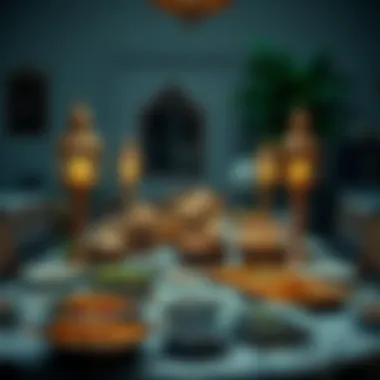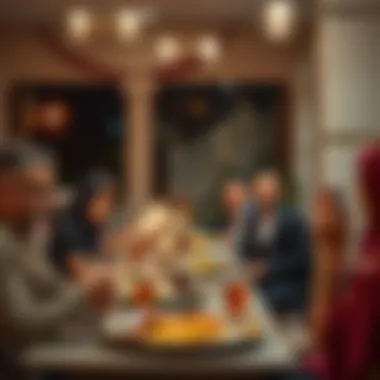Iftar Timing Insights for Dubai During Ramadan


Intro
In the vibrant city of Dubai, the holy month of Ramadan unveils a unique rhythm that resonates through its streets and households. As dusk approaches, the moment of iftar becomes not just a personal ritual but a communal celebration. Understanding iftar timings is fundamental for both residents and visitors, shaping daily life during this sacred month. The anticipation in the air, as the sun dips below the skyline, sparks moments of togetherness, reflection, and gratitude.
Deciphering the intricacies of iftar involves a blend of cultural appreciation and practical knowledge. Each day, the precise timing of iftar reflects not only astronomical calculations but also a deep-rooted respect for tradition. As Muslims break their fast at sunset, the rituals surrounding iftar take center stage against a backdrop of Dubai's modernity infused with its rich heritage.
Through this exploration, we will shed light on how iftar timings are computed, the significance of communal gatherings, and the cultural importance that these moments hold amidst the hustle and bustle of city life. Let’s embark on this journey to understand how iftar timings define the Ramadan experience in Dubai.
Prelude to Iftar
Iftar, the meal that breaks the daily fast during Ramadan, holds profound significance for Muslims worldwide. In the vibrant context of Dubai, this ritual transcends mere practice; it represents a confluence of spirituality, community, and cultural heritage. Understanding Iftar is essential, not just for devout observers but also for expatriates and visitors who wish to appreciate the local customs. Delving into its importance lays a rich foundation for comprehending the broader tapestry of Arabian culture.
The Importance of Iftar
The importance of Iftar lies in its function as a revitalizing moment at dusk. It marks the end of fasting, a time of reflection and gratitude. Traditionally, individuals await sunset, gathering with family and friends to partake in the evening meal. It’s not solely about consuming food but about nourishing the spirit. Communities come together, often sharing food with the less fortunate, enhancing bonds that may have diluted during everyday hustle. This shared act is pivotal; it not only fills the stomach but reignites social connections throughout the city.
Iftar serves as a reminder of humility and empathy, teaching individuals to appreciate their blessings and to offer help to those in need. The meals can range from simple dates and water to extravagant spreads that include traditional dishes like harees or maamoul. The diversity of flavors reflects Dubai's multicultural society, enriching the overall experience.
Iftar in Dubai's Culture
In Dubai, Iftar takes on a unique character, vibrant with traditions that differ from other regions. As the sun sets, the city comes alive with Iftar tents, restaurants, and community gatherings. Each year, these communal practices grow, illustrating the deep-rooted generosity of Emirati hospitality. The local populace, along with expatriates, engage in this spiritual observance, bringing various cultural flavors to the table.
Dubai’s hotels often feature lavish Iftar buffets, showcasing a spectacular array of international and local cuisines, resonating with multicultural participation. It’s common to see families, friends, and even coworkers breaking bread together, fostering camaraderie. Consider visiting places like the Hyatt Regency and the Ritz-Carlton, where one can experience an ambassadorial exchange of culinary delights.
Additionally, mosques across the city open their doors to those in need, offering free meals to anyone who wishes to join. This aspect of Iftar emphasizes inclusivity, making it clear that the spirit of Ramadan is about community, not isolation.
As night falls, the atmosphere shifts, fireworks often illuminate the horizon, marking the end of a day of fasting. Streets buzz with excitement, and shops stay open late, reflecting the vibrant nightlife of Dubai during Ramadan.
Determining Iftar Timing
Determining the Iftar timing is not just about when to break the fast; it's a key aspect of the spiritual and communal experience during Ramadan. In Dubai, this determination is influenced by a complex interplay of cultural practices, religious observances, and modern technology. For expatriates and locals alike, understanding this timing ensures they can participate fully in the nightly rituals, whether that means gathering with family or sharing meals with friends.
Traditional Calculation Methods
Historically, the calculation of Iftar timing relied on simple observations and the natural environment. The depletion of sunlight marks the end of the daily fast, and traditionally, Muslims would watch the sun sink below the horizon. In Dubai, landmarks like the UAE’s tallest structures or surrounding mountains often served as natural indicators. The call to prayer, or Azaan, emanating from mosques also signals the moment to break the fast.


Furthermore, some families maintain age-old traditions of using a physical sundial or, in a more modern twist, an app that simulates this age-old method while observing the local sunset times. The underlying principle remains the same: awareness of natural changes is paramount in deciding the moment of Iftar.
Modern Applications and Tools
Today, determining Iftar timing has taken on a more sophisticated approach. Smartphone applications such as IslamicFinder or Muslim Pro have gained popularity among residents and visitors alike. These apps provide real-time timings tailored to individual geographical locations within Dubai. Besides, they offer features that can adjust for slight variations in timings based on the user's precise location.
Many mosques and community centers publish Iftar calendars that detail specific times for each day of Ramadan. The availability of these resources allows community members to seamlessly integrate Iftar into their daily schedules, making the experience all the more convenient and accessible.
Factors Influencing Iftar Timing
The timing of Iftar in Dubai doesn't occur in a vacuum; it's affected by various local factors. For starters, geographical coordinates dictate the angle of sunset, which shifts slightly over the course of Ramadan. Additionally, the shifting of daylight saving time, although not currently observed in the UAE, can impact what time residents feel is suitable.
Local weather conditions, such as cloud cover and dust storms, may also affect visibility, causing minor delays in the actual breaking of the fast. Different communities within Dubai may choose to observe Iftar a minute or two apart; this serves to enrich the shared experience as families and friends eagerly await the call to prayer together.
In summary, determining Iftar timing is an essential function within the rich tapestry of Dubai's Ramadan observances, combining ancient traditions with modern tools and community observations to enhance the spiritual experience.
Iftar Timing Today in Dubai
Iftar timing occupies a central position in the daily rhythms observed during Ramadan, especially in a bustling metropolis like Dubai. The moment when individuals break their fast has profound implications not just on a personal level but also in community dynamics. The time to eat after a long day of fasting triggers a beautiful blend of anticipation and communal spirit, making it a crucial aspect of daily life for many.
Current Year Factors
Understanding the factors that affect iftar timing in the current year adds a layer of richness to the experience. For instance, the timing is influenced by astronomical data, which can vary yearly due to the moon's cycles. Ramadan is framed by the sighting of the crescent moon, marking the beginning of the month. Consequently, the first iftar of the year might vary slightly from the previous year, making up-to-date resources critical in planning.
For example, in 2023, Ramadan began on March 23rd. As this lunar month progresses, iftar timings shift, usually getting later as the month continues. This yearly variation requires residents and visitors to check current timings regularly, which are often posted in mosques, restaurants, and community centers across Dubai. Online platforms like IslamicFinder provide updated prayer and iftar times tailored to specific locations in the emirate, ensuring accurate consideration of local conditions.
Factors to Consider:
- Geographic Location: Dubai’s unique layout means iftar timing can vary between neighborhoods.
- Astrological Factors: The position of the moon plays a major role in determining the precise time.
- Cultural Practices: Some families may wait until their specific community’s call to prayer, adding a social dimension to iftar timings.
Regional Variations within the City
Dubai is not just a singular entity; it's a collage of cultures and traditions woven together, each bringing its own nuances to the iftar experience. Various neighborhoods may exhibit significant differences in iftar timing, often dictated by local mosques and cultural practices.
In areas like Deira or Bur Dubai, the rich historical fabric of the community could lead to slightly different customs surrounding iftar as compared to the more modern neighborhoods like Downtown Dubai or Jumeirah. While the overarching framework based on astronomical calculations remains constant, local flavor adds an interesting dynamism.
For example, in bustling Jumeirah, iftar might be a more lavish affair, often marked by communal gatherings or restaurant promotions, with many dining venues offering special iftar menus featuring traditional dishes like dates, lamb, and a variety of sweets. In contrast, quieter suburbs might lean more towards intimate family gatherings, celebrating with home-cooked meals and traditions passed down through generations.


Regional variations contribute to a unique tapestry that defines the iftar experience in Dubai, revealing how diverse influences shape a common tradition.
Another element to consider is the influence of expatriate communities in Dubai. With a multitude of cultures represented, from South Asian to Middle Eastern, the approach to iftar may vary, offering a delightful blend of culinary and social experiences. Each group brings its own rituals, recipes, and traditions, creating myriad ways to honor the breaking of the fast.
Community Aspects of Iftar
Engaging with the community during Iftar reflects a sense of belonging and unity that is particularly strong in Dubai. As the sun sets, the act of breaking the fast becomes more than just a personal ritual; it transforms into a collective celebration that honors both tradition and community ties. The shared experience of Iftar fosters connections not only among families and friends but also between neighbors and even strangers, allowing individuals from diverse backgrounds to engage with one another. This essence of communal Iftar brings forth the idea that Ramadan is not solely a month for personal reflection but a time that underscores the strength of community bonds.
Shared Experiences in Dubai
In Dubai, the act of coming together for Iftar creates a tapestry of shared experiences across various groups. Many restaurants and hotels go all out during Ramadan, offering special Iftar buffets where countless flavors and cuisines come to life. The aroma of traditional dishes like harees, majboos, and samosas wafts in the air, welcoming both locals and expatriates to relish the moment.
Family gatherings are commonplace, as families of all sizes prepare tables laden with an array of dishes, inviting not just immediate family but often friends and neighbors as well. These feasts serve as a time for storytelling, connecting generations, and reinforcing cultural practices. Local organizations also often spearhead community Iftars, bridging gaps between different cultures by inviting people from all walks of life, allowing them to savor not only the food but also a sense of community.
"Breaking bread together is a tradition that transcends borders, and in Dubai, during Ramadan, it’s a reminder of our shared humanity."
Iftar Events and Gatherings
The myriad Iftar events in Dubai make the experience even more enriching. Hotels such as the Burj Al Arab and the Atlantis, The Palm host grand Iftar events that attract large crowds, showcasing cuisines from around the globe in luxurious settings. However, it’s not just the lavishness that draws people in; it's the opportunity to engage with others in a meaningful way.
Expect to find public gatherings in parks or community centers where people can come together to share meals, enabled by various organizations focusing on inclusivity. For example:
- Social initiatives often organize large community dinners where anyone is invited, fostering open conversations and camaraderie.
- Charity Iftars provide meals to those less fortunate, reminding everyone of the spirit of giving that Ramadan embodies.
These events highlight the diversity that Dubai prides itself on, creating an environment where cultural exchange thrives amidst shared values of compassion and generosity. Individuals who partake in these gatherings often leave with not just full bellies but also enriched souls, having forged new friendships and broadened their understanding of different cultures.
Ultimately, the community aspects of Iftar contribute to a deeper appreciation of Ramadan's significance, reinforcing a collective identity that goes beyond mere observance of a religious duty. It emphasizes the beauty of unity across diverse communities in this dynamic city.
Impact of Iftar Timing on Daily Life
The timing of iftar holds weight not just in a spiritual sense but also in the practical daily lives of those observing Ramadan in Dubai. During this month, the break of fast is not just a meal; it’s a moment of reflection, community, and often joy. Understanding when this moment occurs can shape various aspects of life, from work schedules to social interactions.
Adjusting Daily Routines
As the sun dips below the horizon, many in Dubai adjust their daily routines to align with iftar. The call to prayer announces the moment when families gather around tables laden with culinary traditions. But this isn’t just about grabbing a quick bite; it requires careful planning.


Many professionals find themselves altering their work hours. Employers appreciate the cultural significance of the month and may offer flexible schedules or adjust meeting times. This shift can lead to a communal feeling in the workplace, bringing employees together as they plan around this cherished time. Additionally, schools often adjust their timings to accommodate students breaking their fast at home with family. Here, we see how iftar timing transcends being merely a personal commitment, morphing into a shared societal adjustment.
- Display of teamwork: Colleagues might decide to break their fast together, fostering bonds.
- Increased productivity: Students often perform better when their energy levels are managed around mealtimes, so schools may see an upsurge in academic focus.
Work and Social Life Balance
Navigating the intersection of work and social commitments can be a daunting task during Ramadan, especially with the added dimension of iftar. It often requires careful orchestration balancing deadlines, meetings, and social gatherings.
As iftar approaches, many professionals find themselves prioritizing family gatherings or community events after breaking their fast. Networking during Ramadan can take on a different tone, where socializing often revolves around iftar invitations. Expecting guests can lead to elaborate preparations, highlighting the importance of hospitality in Arab culture.
Keeping that balance requires foresight. Here are several considerations:
- Flexibility at Work: Employers who allow for a more relaxed scheduling often see happier and more engaged employees. This flexibility can lead to greater loyalty among workers in return.
- Community Events: Engaging in iftar dinners within local communities enriches social life, deepening connections across diverse cultural backgrounds.
- Personal Time Allocation: Some people may find solace in quiet moments after iftar, using this time for personal reflection or family engagement.
"Iftar is more than just breaking fast; it’s about community, family, and connecting with one’s roots."
Through these adjustments and mindful planning, the timing of iftar doesn’t just signify the end of the day’s fasting. It encapsulates an entire way of life, enhancing both personal and collective experiences during Ramadan in Dubai.
For more tips on managing daily life during Ramadan, you can check out resources on local cultural practices or discuss with fellow observers on platforms like Reddit.
Ending
Understanding the timing of iftar, especially in a vibrant metropolis like Dubai, is not just a matter of religious observance; it plays a crucial role in daily life and cultural practices. The act of breaking the fast at sunset is laden with significance, representing a moment of gratitude, reflection, and community. For investors, expatriates, and locals alike, being in tune with iftar times can enhance their experience of Ramadan and foster deeper connections within the community.
Reflecting on Iftar's Significance
Iftar serves as a bridge linking individuals to their faith and community. It marks the end of a long day of fasting and provides an opportunity for families and friends to gather, share food, and engage in heartfelt conversations. In Dubai, the significance of iftar is amplified through its diverse society where various cultures come together. Each meal shared is not just about filling the belly, but also about fostering bonds, understanding traditions, and honoring the Ramadan spirit.
Moreover, iftar reflects the social fabric of Dubai. It encourages people to step back from their fast-paced lives, reinvigorating connections that often get swept aside during the daily grind. Whether it’s in luxurious hotels offering lavish buffets or simple gatherings at home, the essence of iftar continues to inspire unity and goodwill.
Looking Ahead: Future Considerations
Anticipating the future of iftar in Dubai involves recognizing the impact of modern technology and rapid urbanization. As the city continues to evolve, it opens doors for innovative methods of determining iftar times and even altering practices. With easy access to apps and online platforms, residents can conveniently know the iftar timings tailored to their specific locations in Dubai. Additionally, as the city welcomes more expatriates, the diversity of Ramadan practices may grow, allowing for a more enriching experience.
The future may also see a transformation in how communal iftar events are organized. Local communities might adopt more sustainable practices to reduce food waste while still ensuring that no one breaks their fast alone.
In summary, the timing of iftar in Dubai transcends mere minutes on a clock; it encapsulates deep-seated values that bind the community. As we move forward, keeping a close eye on these changes and challenges will be key to preserving the spirit of this essential Ramadan practice while adapting to the rhythms of a modern city.
"Iftar is not just about breaking the fast; it is about breaking barriers between people and bridging the gaps that separate us."
For further reading:
- The Spiritual Significance of Ramadan
- Cultural Practices in the Middle East
- Dubai Events During Ramadan
- Understanding Dubai's Diversity







